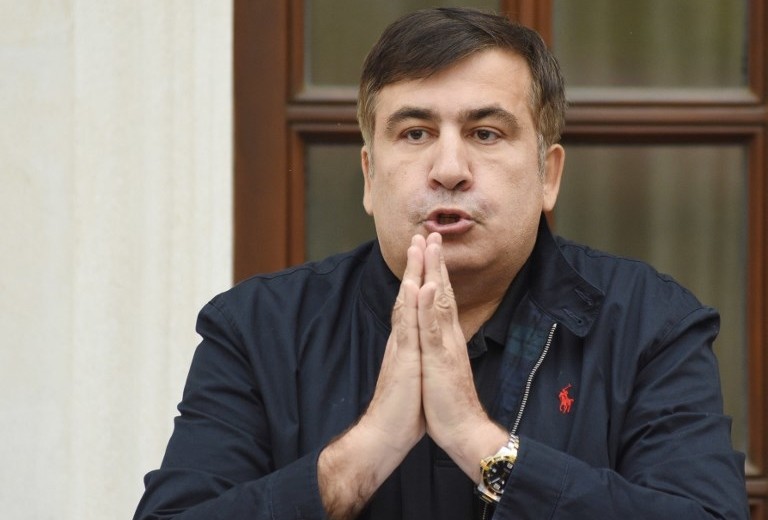Ex-Georgian President Mikheil Saakashvili said at a rally at a protest tent camp in front of the Verkhovna Rada on Nov. 19 that he was ready to become Ukraine’s prime minister. It was the first time the opposition politician said that: Previously, Saakashvili has denied such an ambition.
“Let’s create a new government of Ukraine,” Saakashvili said as hundreds rallied in front of the parliament building. “I’m ready to spearhead this process jointly with you and to head this government if necessary.”
Saakashvili has said before that, if the authorities fail to meet the protesters’ demands, the protesters should launch the so-called “popular impeachment” of President Petro Poroshenko and other top officials starting from Dec. 3.
He was referring to large-scale protests to force the incumbent authorities to resign. Saakashvili said he expected the current authorities to be out by the end of this year if they fail to listen to the people.
The demonstrators who have camped out in front of the Rada since Oct. 17 are demanding the lifting of lawmakers’ immunity from prosecution, legislation to introduce a fairer electoral system, the creation of an independent anti-corruption court and a law setting procedure for presidential impeachment.
Earlier this week Saakashvili led protests in the town of Smila in Cherkassy Oblast triggered by the absence of heating and garbage disposal. The protests led to the resignation of Smila’s acting Mayor Viktor Fedorenko on Nov. 16.
“What happened in Smila is the model for what will happen in Kyiv,” Saakashvili said on Nov. 19.
Saakashvili also lambasted the authorities for the kidnapping of his four Georgian associates on Nov. 17.
He compared Poroshenko to Russian dictator Vladimir Putin illegally deporting Georgians en masse in 2006 during a standoff with Georgia.
“When the authorities start to do this, this brings them closer to their end, and their end is near,” he said.
Four Georgian associates of Saakashvili, including a journalist and two veterans of the war with Russia, were kidnapped by camouflaged masked people on Nov. 17, according to Saakashvili, several eyewitnesses, and video footage.
David Sakvarelidze, a top member of Saakashvili’s Movement of New Forces, said that one of the deported Saakashvili associates, Rustavi 2 television journalist Tamaz Shavshishvili, was heavily beaten. A Kyiv Post reporter saw stains of blood in his apartment.
The Security Service of Ukraine, or SBU, late on Nov. 17 indirectly admitted taking part in the events, saying that it had deported eight unnamed citizens of Georgia to their homeland jointly with the National Police, State Migration Service and State Border Guard. The SBU claimed that the Georgians’ activities are at odds with national security, without specifying what the alleged security threats were, and that the deportation was carried out according to the law.
However, as of late Nov. 19, Ukrainian authorities refused to directly name the Saakashvili associates among those deported or say if there is any documentary proof or court warrants for their deportation. Under Ukrainian law, forced deportation is only possible with a court warrant.
Sakvarelidze and Samopomich party lawmaker Semen Semenchenko said late on Nov. 19 that the kidnapped Saakashvili associates had been deported by ferry to the Georgian city of Poti and arrived there.
Saakashvili said that the kidnapped Georgians had been transported on three helicopters from Kyiv to Odesa and from there to Poti. The operation was spearheaded by Valery Heletei, head of the State Security Service, and Serhiy Kosik, head of the State Border Guard’s Southern Branch, Saakashvili added. Heletei and Kosik were not available for comment.
Boris Zakharov, a top member of the Ukrainian Helsinki Human Rights Union, said on Facebook on Nov. 19 that the kidnapping and deportation of the Saakashvili associates violated Ukrainian law, Article 29 of Ukraine’s Constitution and Article 5 of the European Convention of Human Rights. He added that the events can be qualified as a crime under the Criminal Code article on kidnapping.
Saakashvili also said that Security Service of Ukraine (SBU) employees had heavily beaten his Ukrainian driver. The SBU did not respond to a request for comment.
Reformist lawmaker Sergii Leshchenko said at the rally that the government was currently trying to destroy both Saakashvili and the National Anti-Corruption Bureau.
Prosecutor General Yuriy Lutsenko on Nov. 17 took a high-profile case into alleged graft at the National Agency for Preventing Corruption from the NABU and transferred it to the presidentially controlled Security Service of Ukraine. Critics saw this as an effort to bury the case and cover up for NAPC officials.
The NABU has also said that it would have to stop all of its ongoing graft invetsigations when the Prosecutor General’s Office transfers its cases to the NABU by the Nov. 20 deadline.
So far, the authorites have not fully met any of the demonstrators’ demands.
The Verkhovna Rada on Nov. 7 passed in the first reading a bill to introduce a new electoral system as thousands of protesters rallied outside. On Oct. 19, the Verkhovna Rada also sent two bills on lifting lawmakers’ immunity for consideration to the Constitutional Court after thousands rallied near the parliament building on Oct. 17.
However, Poroshenko has so far failed to submit a bill on an anti-corruption court to parliament, and a bill on presidential impeachment has not been considered yet.



